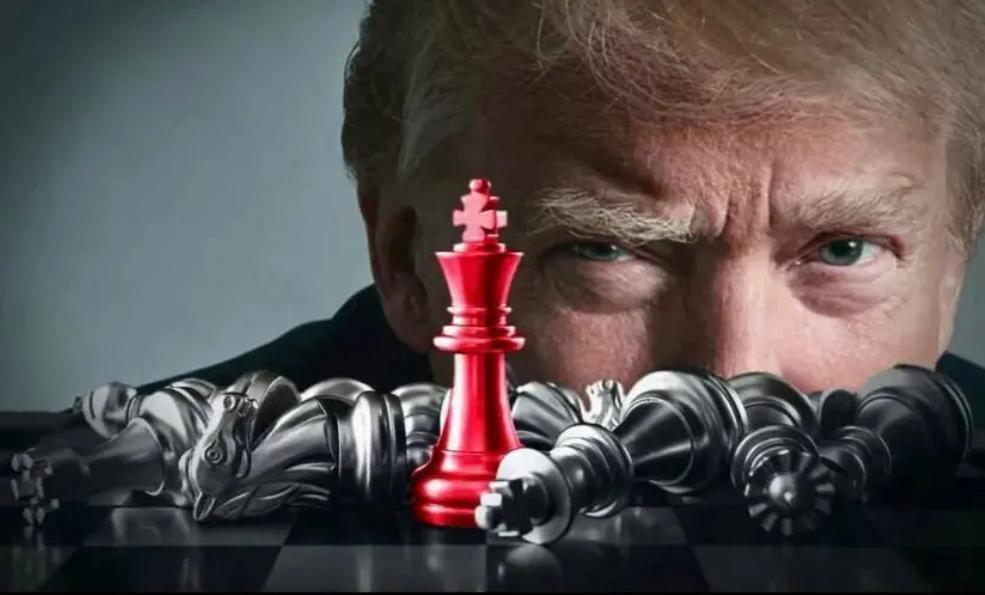
In an interview with NBC last week, Trump once again praised his trade policy, stating that his "White House tariff measures have received widespread praise," and attributed the stock market's record high to this policy. Indeed, the S&P 500 index and Nasdaq are climbing, but the question is - do investors really believe that he will fulfill those tariff threats?
The answer seems to be negative. Wall Street even gave Trump a nickname: "TACO" (Trump Always Chickens Out). The reason why the stock market can maintain strong performance is precisely because investors generally believe that it will not really implement punitive tariffs of up to 50% on global commodities.
Since Trump's high-profile announcement of global tariffs in the White House Rose Garden on April 2nd, financial markets have experienced severe volatility. Although he announced the imposition of tariffs on almost all imported goods, he postponed the implementation for three months just one week later. In early July, he postponed the tariff deadline again and admitted that "August 1st is not 100% certain". This repeated operation not only weakens the credibility of the government, but also leaves businesses and markets highly uncertain.
Although tariffs have not yet fully taken effect, many companies have already felt the pressure ahead of time. Hasbro, which mainly produces toys, recently warned that prices may rise in the autumn; The futures price of copper, a key metal used in the construction, power, and high-tech industries, has soared to a historic high. In addition to heavy taxes on steel, aluminum, and automotive components, American manufacturers are facing pressure from rising supply chain costs across the board.
According to data from the US Treasury Department, the United States has earned over $113 billion in revenue from tariffs since fiscal year 2025. It may sound like 'incoming', but the problem is that most of this money is actually being paid by American companies and consumers. Deloitte economists point out that the current consumer prices have not risen significantly, mainly due to companies hoarding goods in advance or temporarily sacrificing profits to absorb costs, but this practice will not be sustainable. Once inventory is depleted, price increases will be inevitable.
What does this mean for the economy? From the first quarter data, the US GDP has shown negative growth, partly due to a surge in imports (rushing to grab goods before tariffs). And consumer spending, which truly reflects economic vitality, is weakening. Although the Atlanta Fed predicts a rebound to 2.6% in the second quarter, overall economic growth in the United States has been noticeably weak in the first half of the year, far from the strong performance of 2023.
What is even more worrying is the scenario simulation ahead. According to Deloitte's forecast, if the average tariff rate remains around 15%, GDP growth in 2025 will only be 1.4%, halving from last year; If trade negotiations completely break down and tariff shocks escalate, the United States will fall into recession next year, with GDP shrinking by 1.6% and unemployment soaring to 5.7%.
Trump likes to treat economic negotiations as hotel negotiations, always believing that price increases can force the other party to make concessions. However, this "businessman" logic has limited effectiveness in international trade and instead creates uncertainty and chaos in the global economic order. Especially in the current tense relationship between China, the United States, and Europe, and the high dependence on cooperation in the global industrial chain, one round after another of "tariff games" will ultimately put the United States itself in a difficult situation.
Perhaps Wall Street is still betting that he will 'wait a little longer'. But manufacturing, importers, retail, and even ordinary households are finding it increasingly difficult to wait.

報告顯示,中國電力投資加速增長,預計2024年電網基建投資將超過5300億元。
近日,市場迎來了一則引人注目的消息:工業巨頭3M公司(MMM.N)在本周五公布了其季度業績報告,隨後股價飆升至近兩年來的
最近,外媒給OpenAI算了筆賬,今年可能要血虧50億美元。
近日,巴黎奧運會和世界鐵人三項協會聯合發布了一項重大決定,宣布因塞納河水質污染問題,原定於近期進行的奧運會鐵人三項首次下
當地時間7月18日,法國巴黎發生了一起令人震驚的持刀襲警事件。
近期,一則重大消息在國際舞臺上引起軒然大波,馬來西亞宣布加入金磚國家。
調查發現,互聯網和智能手機的使用幹擾了韓國近五分之一學生的生活。